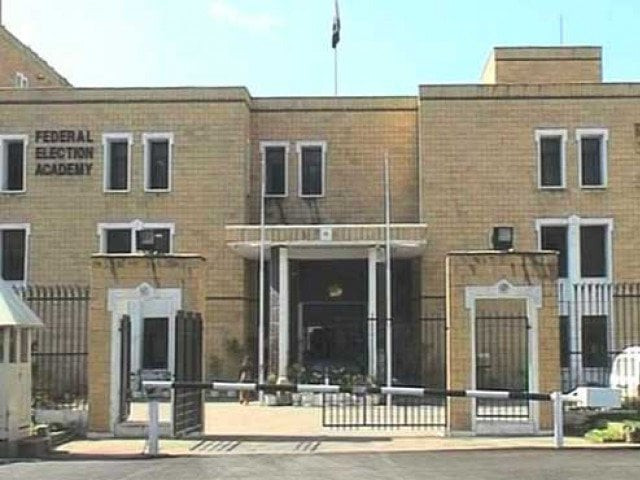Pakistani diaspora: ECP approves limited overseas voting right
PTI Ishaq Khakwani rejects restriction stating 4.7 million Pakistani voters live abroad

Election Commission of Pakistan. PHOTO ECP.GOV.PK
The draft of ECP’s recommendations suggests that the document was prepared with consensus of all stakeholders, including Pakistan Tehreek-e-Insaf (PTI). PTI’s Ishaq Khakwani said his party would not accept any such restrictions as 4.7 million voters are overseas. For 67 National Assembly seats the difference of votes between winner and runner is often below 5,000, he added.
According to ECP’s recommendations, the postal ballot option can be exercised in two phases. It could first be launched as a pilot project wherein the facility of postal ballot may only be extended to the diplomatic staff. In the second phase, it may be extended to the entire diaspora.
These recommendations would be presented before parliament for approval. A parliamentary subcommittee on electoral reforms had earlier asked the ECP to work out this proposal. The ECP constituted a working group for the purpose.
Following the directions of the committee, the ECP agreed to undertake a study in the matter taking into consideration best international practices and submit its recommendations. The commission also invited representatives of International Foundation for Electoral Systems (IFES-Pakistan) and UNDP-Pakistan, citing their wider knowledge on the topic. PTI’s Dr Arif Alvi and PML-N’s Dr Tariq Fazl Chaudhry were also part of the group on the nomination of the parliamentary subcommittee on electoral reforms.
Alvi took time to respond when asked why he did not oppose this draft. “It is absolutely wrong [and, as currently] there is no leadership in the ECP and the idea of postal balloting is useless,” he replied through SMS.
The working group recommended that voting by postal ballot can be the most feasible option for extending the voting right to overseas Pakistanis. Around 25 countries, including Austria, Bangladesh, Canada, Germany and Norway, are practicing by-mail external voting. This mechanism involves less financial costs and logistics as compared to other systems of voting from abroad. It is relatively more reliable, transparent and secure mode of voting, the findings of the group suggest.
The working group’s study noted that the right to vote for citizens abroad is not recognised as an international suffrage and it is a relatively a new phenomenon. It says that around 115 countries have established legal provisions by 2007 allowing out of country voting (OCV) for its citizens abroad.
Internet voting is not a fully secured option. Even Nadra’s suggested approach carries all risks and challenges, the ECP findings say. The internet voting is only implemented in Estonia, a tiny country with small population with an advanced TI infrastructure. However, the ECP agreed to the proposal that initially this be implemented as a pilot project for the officials in Pakistan High Commissions/Embassies/Consulates for technical and operational testing.
About 54 countries are providing in-person voting facilities to their overseas citizens. However, the ECP study suggests that some countries’ population is lower than the number of overseas Pakistanis who are issued NICOP by Nadra. Approximately, six millions overseas Pakistanis are in possession of NICOP. The study pointed out practical difficulties and limitations in exercising this option. This option has been declared most expensive and entirely depends on the approval of the host country and support of local authorities.
Published in The Express Tribune, September 13th, 2015.



1724319076-0/Untitled-design-(5)1724319076-0-208x130.webp)















COMMENTS
Comments are moderated and generally will be posted if they are on-topic and not abusive.
For more information, please see our Comments FAQ